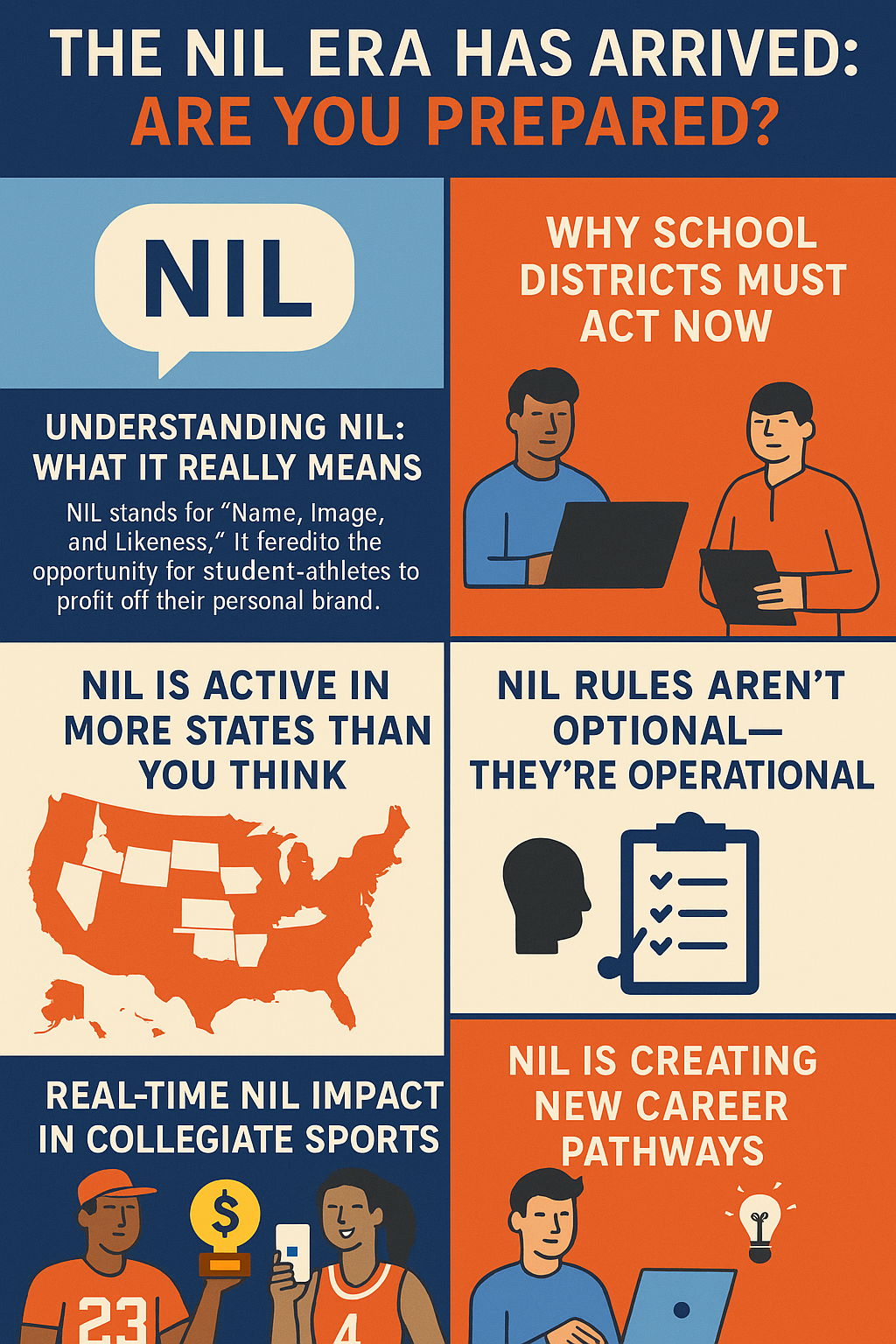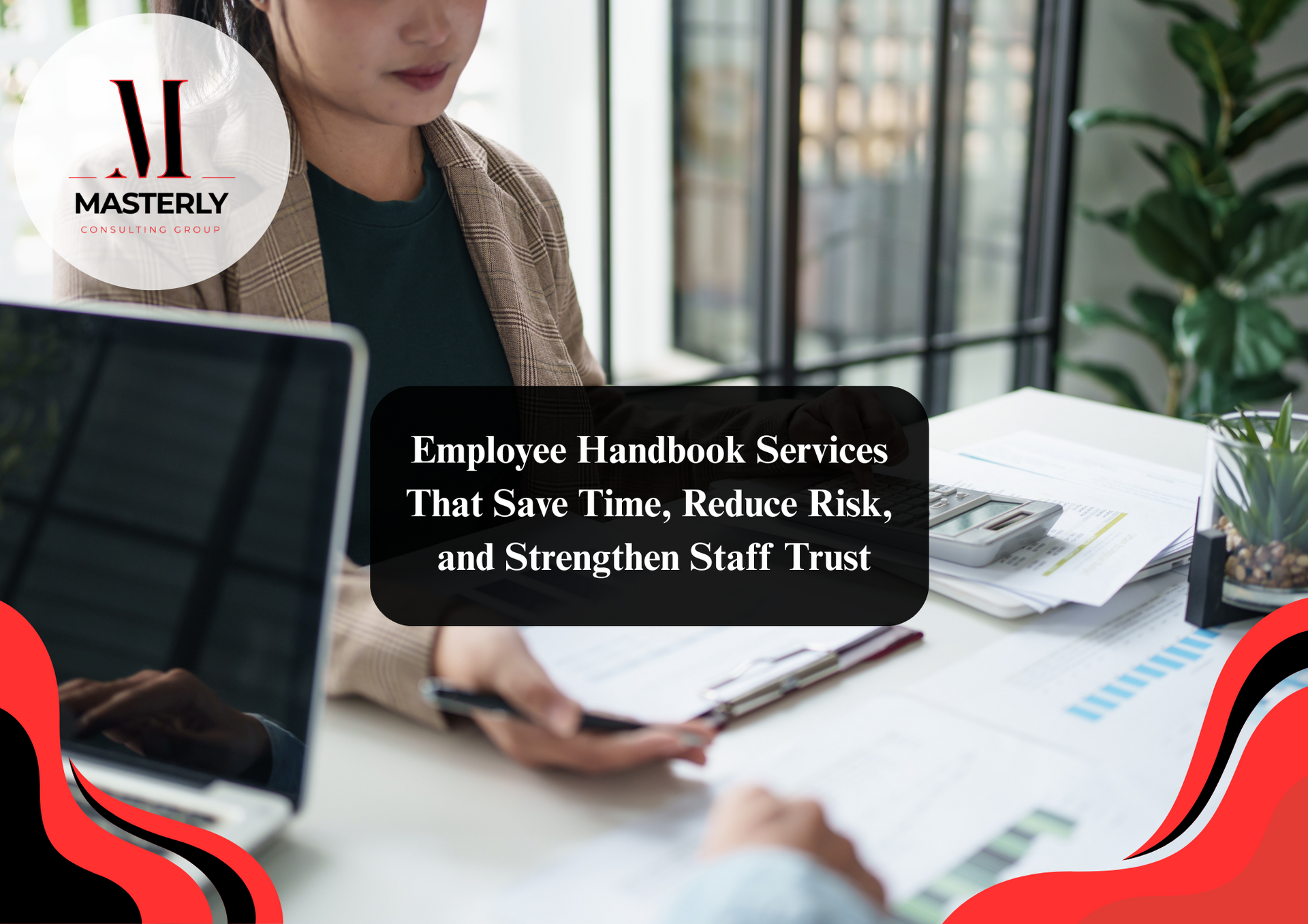NIL is Already Here But Is Your School Ready for It?
The NIL Era Has Arrived: Are You Prepared?
The NIL movement is no longer a speculative trend. It is a transformative shift in how student athletes can benefit from their name, image, and likeness. From high school fields to NCAA Division I arenas, NIL is actively changing the rules of the game. Schools across the country are already feeling the effects, and if your district or athletic program isn’t prepared, you risk losing more than just games—you could be risking eligibility, compliance, and student trust.
Understanding NIL: What It Really Means
NIL stands for "Name, Image, and Likeness." This term refers to the rights of athletes—from high school to collegiate levels—to profit from their personal brand. These rights include:
- Participating in endorsement deals
- Signing sponsorship contracts
- Creating social media content for pay
- Launching business ventures or merchandise
- Hosting training camps or public appearances
It doesn’t mean schools are paying athletes to play. NIL is not the same as "pay for play." Instead, it means student athletes can leverage their talents and visibility in the same way influencers, artists, and entrepreneurs do.
NIL Is Active in More States Than You Think
As of now, more than 30 states allow high school student athletes to engage in NIL activities without risking eligibility. States like Texas, New Mexico, and South Carolina have already launched NIL frameworks, signaling a fast-moving trend. In some cases, even local school districts are developing their own NIL rules. The question is no longer if NIL is coming to your state—it already has.
- Texas: A leader in NIL activity for both high school and college student athletes.
- New Mexico: Among the first to support NIL at the high school level.
- South Dakota and North Dakota: Have set up NIL policies with clear compliance rules.
- Rhode Island and New Hampshire: In the process of finalizing their NIL regulations.
Why School Districts Must Act Now
Delaying NIL readiness is a mistake. While federal legislation lags behind, states are taking the lead, and the rules vary greatly. That makes it essential for each school district to not only be informed but to proactively adopt policies that guide student athletes, protect schools, and prevent missteps.
Without clear guidance, your students could unknowingly sign nil agreements that compromise eligibility. Worse, schools could face backlash for not providing the support athletes now expect.
The Role of Athletic Directors Has Changed
The job description for a high school athletic director has expanded overnight. Directors now need to understand NIL deals, legal implications, and media strategies. To stay competitive and compliant, your responsibilities must include:
- Overseeing athlete education programs on NIL rights
- Monitoring and reporting NIL activities
- Collaborating with district attorneys and compliance officers
- Educating coaching staff about permissible NIL activities
- Creating NIL workshops and outreach for parents and community stakeholders
NIL Rules Aren't Optional—They're Operational
This isn’t just a hot-button topic. NIL is reshaping the way student athletes interact with their schools, their communities, and their futures. Districts and schools must implement NIL regulations that address:
- Acceptable business ventures and sponsorship deals
- NIL activities permitted during the school year or season
- Communication protocols for reporting NIL agreements
- How school logos or uniforms may be used in NIL campaigns
Every school should aim to make informed decisions that align with both state laws and ethical obligations.
Real-Time NIL Impact in Collegiate Sports
College student athletes have embraced NIL with open arms. In just a short span, we’ve seen:
- Football players launching merchandise lines
- Women’s basketball stars becoming social media influencers
- Wrestlers and swimmers forming partnerships with local brands
Collegiate athletes are no longer waiting for endorsement deals to come to them—they're creating their own brand strategies and monetizing opportunities with or without the NCAA's full blessing.
High School Athletes Are Watching
High school student athletes are well aware of what their college counterparts are doing. They’re ready, eager, and increasingly informed. Without school guidance, they may pursue deals on their own, leading to consequences that could include:
- Losing eligibility due to improper NIL activities
- Entering contracts without legal counsel
- Damaging long-term career prospects through early missteps
Proactively educating high school athletes is not just about prevention. It’s about empowering students to build their brand and take control of their futures.
NIL Is Creating New Career Pathways
For students interested in media, marketing, finance, or entrepreneurship, NIL opens up career exploration through hands-on experience. They learn to:
- Create and grow a personal brand
- Manage social media professionally
- Network with local businesses and organizations
- Understand intellectual property and contract law
This is more than a side hustle. NIL is becoming a legitimate foundation for college and career readiness.
NIL Training for Coaches and Faculty
Coaches and faculty need more than casual awareness of NIL. They need structured, up-to-date training on:
- Federal, state, and local NIL regulations
- Recognizing red flags in NIL opportunities
- Guiding athletes without overstepping ethical boundaries
- Communicating effectively with parents and boosters
One misstep from an uninformed coach could cost an athlete a scholarship, eligibility, or a professional opportunity. Schools must invest in NIL literacy across all levels of staff.
The Importance of Legal Review for NIL Agreements
NIL deals can be complex. Without proper legal oversight, student athletes could:
- Be underpaid or misled
- Lose rights to future earnings from their own image
- Get trapped in long-term, unfavorable contracts
Schools must offer access to qualified professionals who can review NIL contracts and explain what certain categories of terms really mean. Legal counsel is not a luxury in the NIL era—it’s a necessity.
NIL Collectives: The New Players in the Game
NIL collectives are forming rapidly to provide funding and deal structures for athletes. While their involvement can be beneficial, they also present potential conflicts of interest.
Districts should create vetting procedures to ensure these groups:
- Follow proper NIL laws
- Do not violate recruiting rules
- Offer real value to student athletes
- Are transparent about their intentions
Marketing Agencies Are Targeting Students
As NIL becomes mainstream, so too do outside marketing firms looking to manage student athletes. These firms promise to handle branding, outreach, and contracts—but not all are reputable. School systems must warn students about predatory agents and ensure any third-party involvement is reviewed thoroughly.
Your School's Reputation Is at Stake
Being unprepared for NIL doesn’t just hurt your athletes. It hurts your school’s credibility, competitiveness, and community trust. Informed parents are already asking tough questions:
- Does this school support student athletes' NIL rights?
- Is there a system to protect my child?
- Will my child lose eligibility over a sponsorship deal?
The answers to these questions must be clear, consistent, and confidently backed by policy.
Get Ahead With a NIL Action Plan
Districts should create and enforce an NIL action plan that includes:
- A designated NIL compliance officer or team
- Regular updates on state and federal NIL legislation
- Ongoing community workshops
- Collaboration with local businesses for approved partnerships
- Documentation and recordkeeping of all NIL deals
This ensures your school is not only compliant but also respected as a leader in student development.
The Urgency Cannot Be Overstated
This is not an issue to push off to next semester or next school year. NIL is rapidly evolving, and inaction today leads to consequences tomorrow. Your school has a duty to be ready.
Every day that passes without a policy, a workshop, or a review system puts your student athletes at risk of falling behind their peers across the country.
What Happens If You're Not Ready?
Schools without NIL readiness may face:
- Lawsuits or complaints over rights violations
- Declining enrollment in athletic programs
- Negative press from NIL scandals
- Loss of elite athletes to more prepared programs
Readiness is not about jumping on a trend—it's about protecting students, schools, and the integrity of athletics.
Building the Right Team for NIL Success
You don’t have to figure this out alone. Building a strong NIL support team can include:
- Legal experts with experience in NIL rights
- Marketing and branding professionals
- School board advocates
- Alumni and former athletes as mentors
- Local sponsors and ethical NIL partners
Working together, your school can create a comprehensive, supportive NIL ecosystem.

Our Students Deserve Better
Student athletes have worked too hard to lose opportunities due to institutional delays or policy gaps. They deserve systems that help them navigate their rights responsibly and maximize their potential.
This moment calls for bold leadership. NIL is not a risk if it's managed with the right tools and knowledge. It's a game-changing opportunity—but only for schools prepared to embrace it.
College Sports and High School NIL: Aligning With the New Rules Across States
As college athletes continue to capitalize on NIL deals in college sports, their success stories are inspiring a wave of student athletes interested in building personal brands at younger ages. This momentum has fueled the rise of high school NIL policies across other states, where allowed student athletes can now legally earn cash and pursue financial opportunities through sponsorships, social media, and merchandise sales. However, each state’s rules differ, creating a complex environment where prospective student athletes risk eligibility issues without clear guidance. While the NCAA rules offer a general framework at the university level, high schools and districts must navigate evolving new rules independently. From Washington to Texas, schools must understand how NIL intersects with eligibility, money, and long-term success—especially for those preparing students for the transition to university athletics.
Talk to Our Team for Expert NIL Support
We understand that keeping up with NIL laws, policies, and regulations can be overwhelming. That's why we provide expert legal consultation and training for school districts, athletic directors, and education leaders. From policy writing to contract reviews and workshops, we're here to help you get ahead.
Have questions about how NIL laws apply to your district or how to safely guide student athletes through the NIL process?
Contact us at (888) 209-4055 to schedule a free consultation. Let's prepare your school to lead, not lag behind. Empower your students, protect your district, and make NIL success a reality.


